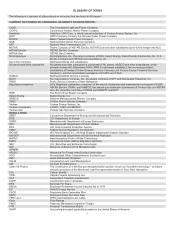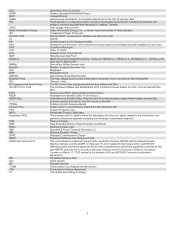Eversource 2013 Annual Report Download - page 20
Download and view the complete annual report
Please find page 20 of the 2013 Eversource annual report below. You can navigate through the pages in the report by either clicking on the pages listed below, or by using the keyword search tool below to find specific information within the annual report.
8
Tests to date indicate that the Scrubber reduces emissions of SO2 and mercury from Merrimack Station by over 90 percent, which is
well in excess of state and federal requirements.
Prudent Scrubber costs are allowed to be recovered through PSNH's ES rates under New Hampshire law. In November 2011, the
NHPUC opened a docket to review the Clean Air Project. For information about this docket, see "Regulatory Developments and Rate
Matters – New Hampshire – Clean Air Project Prudence Proceeding" in the accompanying Management’s Discussion and Analysis.
The following table shows the sources of PSNH’s 2013 electric franchise retail revenues based on categories of customers:
PSNH
(Thousands of Dollars, except percentages)
2013
% of Total
Residential
$
483,716
56
Commercial (1)
293,509
34
Industrial
71,012
8
Other
21,665
2
Total Retail Electric Revenues
$
869,902
100%
(1) Commercial retail electric revenue includes Streetlighting and Railroad retail revenue.
A summary of PSNH’s retail electric GWh sales and percentage changes for 2013, as compared to 2012, is as follows:
2013
2012
Percentage
Change
Residential
3,208
3,138
2.2%
Commercial (1)
3,357
3,338
0.6%
Industrial
1,373
1,345
2.1%
Total
7,938
7,821
1.5%
(1) Commercial retail electric GWh sales include Streetlighting and Railroad retail sales.
Rates
PSNH is subject to regulation by the NHPUC, which has jurisdiction over, among other things, rates, certain dispositions of property
and plant, mergers and consolidations, issuances of securities, standards of service and construction and operation of facilities. New
Hampshire utilities are entitled under state law to charge rates that are sufficient to allow them an opportunity to recover their
reasonable operation and capital costs, to attract needed capital and maintain their financial integrity, while also protecting relevant
public interests.
Under New Hampshire law, all of PSNH's customers are entitled to choose competitive energy suppliers, with PSNH providing default
energy service under its ES rate for those customers who do not elect to use a third party supplier. Prior to 2009, PSNH experienced
only a minimal amount of customer migration. However, customer migration levels began to increase significantly in 2009 as energy
costs decreased from their historic high levels and competitive energy suppliers with more pricing flexibility were able to offer electricity
supply at lower prices than PSNH. By the end of 2013, approximately 25 percent of all of PSNH’s customers (approximately 54 percent
of load) had switched to competitive energy suppliers. This was an increase from 2012, when 9 percent of customers (approximately
44 percent of load) had switched to competitive energy suppliers. The increased level of migration has caused an increase in the ES
rate, as fixed costs of PSNH’s generation assets must be spread over a smaller group of customers and lower sales volume. The
customers that have not chosen a third party supplier, predominantly residential and small commercial customers, are now paying a
larger proportion of these fixed costs. On July 26, 2011, the NHPUC ordered PSNH to file a rate proposal that would mitigate the
impact of customer migration expected to occur when the ES rate is higher than market prices. On April 8, 2013, the NHPUC issued an
order conditionally approving a PSNH settlement with OCA and PUC staff for an Alternative Default Energy (ADE) pilot program rate
which was designed to address customer migration. The NHPUC condition was accepted by the Settling Parties and incorporated into
the initial implementation of Rate ADE in mid-2013. The pilot program results in no impact to earnings and allows for an increased
contribution to fixed costs for all ES customers. PSNH cannot predict if the upward pressure on ES rates due to customer migration will
continue into the future, as future migration levels are dependent on market prices and supplier alternatives. If future market prices
once more exceed the average ES rate level, some or all of the customers on third party supply may migrate back to PSNH.
On January 18, 2013, the NHPUC opened a docket to investigate market conditions affecting PSNH’s ES rate, how PSNH will maintain
just and reasonable rates in light of those conditions, and any impact of PSNH’s generation ownership on the New Hampshire
competitive electric market. On July 15, 2013, the NHPUC accepted from the NHPUC Staff a "Report on Investigation into Market
Conditions, Default Service Rate, Generation Ownership and Impact on the Competitive Electricity Market." The report recommended
that the NHPUC examine whether default service rates remain sustainable on a going forward basis, define "just and reasonable" with
respect to default service in the context of competitive retail markets, analyze the current and expected value of PSNH’s generating
units, and identify means to mitigate and address stranded cost recovery.
On September 18, 2013, the NHPUC issued a Request for Proposal to hire a valuation expert to determine the value of PSNH's
generation assets and entitlements. On October 16, 2013, the State of New Hampshire Legislative Oversight Committee on Electric
























